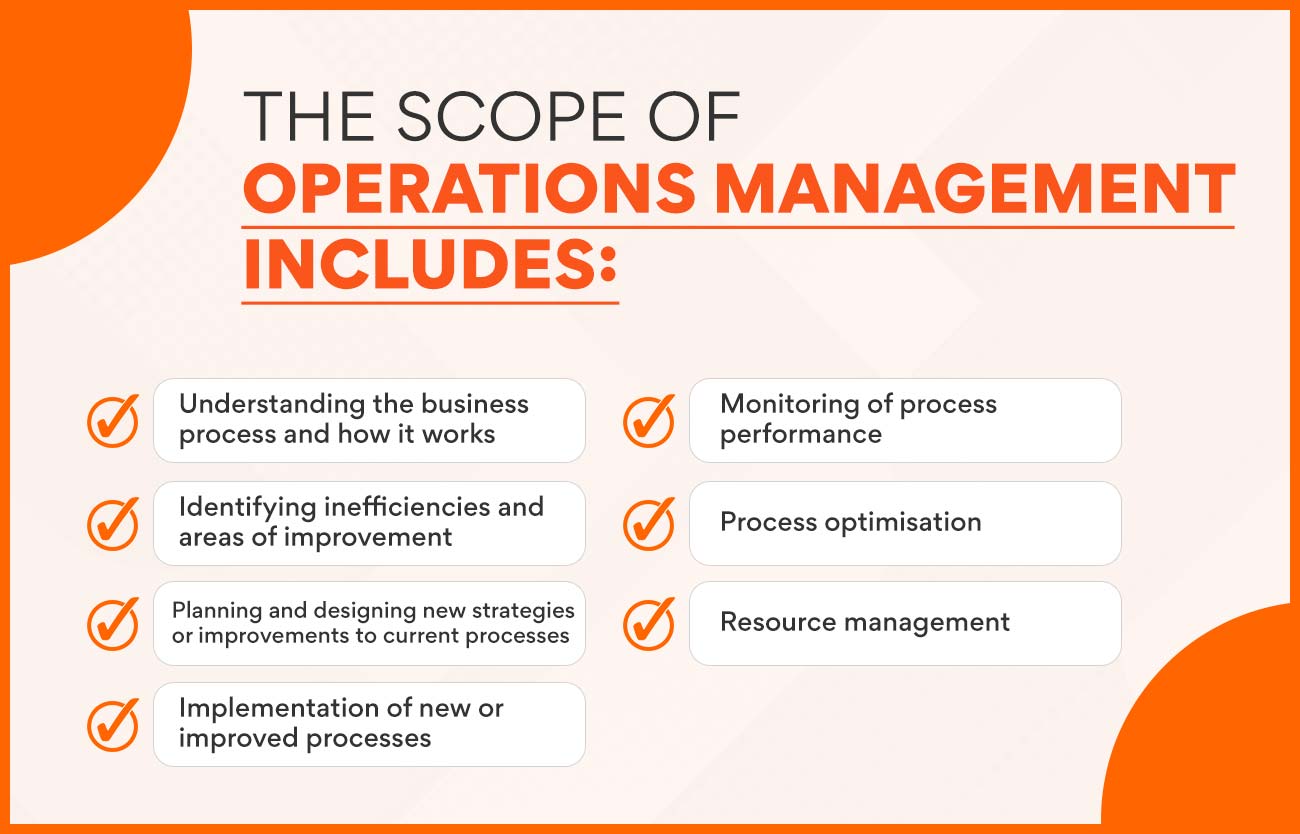Essential Operations Tips and Strategies
Management of Operations: A Complete Guide
The Mintly Team
November 10, 2023
In the world of business, operations management is a pivotal role that bridges the gap between strategy and execution. It focuses on the effective planning, organizing, and controlling of activities that directly produce an organization’s goods or services. This post delves into the intricacies of operations management, its benefits, and the methods used to achieve efficiency and productivity.
Understanding Operations Management
Understanding Operations Management is crucial for any business to run efficiently and effectively. The Management of Operations is a discipline primarily concerned with planning, organizing, and supervising the processes of production, manufacturing, or providing services. It involves ensuring that business operations are efficient in terms of using as few resources as needed, and effective in terms of meeting customer requirements.
Operations managers make decisions about the production and delivery of goods and services. These decisions greatly affect the cost, quality, and profitability of an organization’s products or services. Therefore, the role of operations management is very significant in any organization.
At its core, the Management of Operations is about creating value. This value can be in the form of goods produced or services delivered. It includes a wide range of activities, such as forecasting demand, sourcing raw materials, production, quality control, inventory management, logistics, and customer service. All these activities are interconnected and need to be coordinated to ensure smooth operations.
The overall goal of operations management is to provide high-quality goods or services to customers in a cost-effective manner. This requires a deep understanding of both internal processes and external market conditions. It also requires the ability to adapt and react to changing circumstances, such as fluctuations in supply and demand or technological advancements.
Importance of Operations Management
Operations Management is a critical aspect of any organization, primarily dealing with the creation, planning, and managing the process of production and redesigning business operations. It’s crucial for effectively managing the resources and meeting customer needs.
Firstly, Operations Management is essential for achieving efficiency and effectiveness in the production process. It aids in managing the process of converting raw materials into finished goods. This includes procurement, inventory management, storage, production, and distribution. By streamlining these processes, organizations can improve their productivity and profitability.
Secondly, Operations Management plays a significant role in decision making. It involves making decisions about the design, operations, and control of the production system that transforms resources into finished goods and services. These decisions directly impact the cost, quality, and timeliness of the production process.
Thirdly, it helps in maintaining the quality of goods or services produced. Quality control is a major concern in operations management. Proper operations management ensures that the output of the organization meets the desired quality standards, thereby enhancing customer satisfaction.
Moreover, it is instrumental for innovation. It involves redesigning business operations to match the changing market trends and needs. This can provide a competitive advantage to businesses in a rapidly evolving market.
Lastly, it helps businesses to sustain in this competitive world. Effective operations management can lead to cost reduction, high efficiency, and customer satisfaction. This can result in improved business performance and sustainability.
Key Elements of Operations Management
Operations management is the heart of any organization, ensuring seamless functioning and driving efficiency. It involves the design, execution, and control of operations that convert resources into desired goods and services. Here are some key elements of operations management:
- Production Planning: This is a crucial first step in operations management. It involves determining what products to produce, how much to produce, and when to produce them. It requires balancing demand forecasts with production capabilities to optimize resource utilization.
- Inventory Management: Efficient inventory management ensures that there is an adequate supply of goods or materials required for production but not an excess that ties up funds and storage space. This involves tracking inventory levels, order timings, and order quantities.
- Quality Control: Quality control is vital in maintaining customer satisfaction and brand reputation. This involves setting quality standards, carrying out inspections and tests, and taking corrective actions when problems are detected.
- Capacity Management: Capacity management involves ensuring the organization’s ability to meet demand without causing undue delay or sacrificing quality. This requires managing the workforce, facilities, and equipment effectively.
- Supply Chain Management: This refers to the coordination of all activities involved in producing and delivering the product, from raw material sourcing to final delivery to the customer. It involves managing relationships with suppliers and logistics providers.
- Process Design: Process design involves planning the production process in detail, including the sequence of operations, equipment used, and how tasks are assigned. This is crucial for efficiency and productivity.
- Continuous Improvement: Operations management is not a set-it-and-forget-it function; instead, it requires continuous monitoring and improvement. This involves analyzing performance data, identifying areas for improvement, and implementing changes.
Each of these elements plays a critical role in ensuring that the operations of an organization run smoothly and efficiently, ultimately leading to customer satisfaction and business success.
Techniques in Operations Management
Operations management is a critical aspect of any successful business, and there are several techniques employed in this field to ensure efficient operations and high productivity.
Lean Manufacturing
Lean manufacturing is a production philosophy that emphasizes the minimization of waste. By identifying non-value-added activities and eliminating them, businesses can reduce costs, improve product quality, and increase customer satisfaction.
Six Sigma
Six Sigma is a data-driven technique that aims to eliminate defects and reduce variation in processes. It uses statistical methods to identify problems, measure their impact, analyze causes, improve the process, and control future performance.
Total Quality Management (TQM)
TQM focuses on continuous improvement in all aspects of the organization. It encourages every employee’s involvement and aims for long-term success through customer satisfaction. TQM includes techniques like statistical process control, process design, and supplier quality management.
Inventory Management
Effective inventory management is essential to avoid overstocking or stockouts. Techniques like Just-in-Time (JIT) inventory system help reduce the storage costs and improve cash flow by receiving goods only when they are needed in the production process.
Project Management
Project management is a technique used for planning, executing, controlling, and closing projects. It involves defining the project scope, setting objectives, identifying tasks, allocating resources, and setting timelines.
Supply Chain Management (SCM)
SCM refers to the management of flow of goods and services. It includes all processes that transform raw materials into final products, such as sourcing, logistics, and delivery.
Forecasting
Forecasting is used to predict future sales patterns and trends. Accurate forecasts can help businesses plan production, manage resources, and control inventory.
Managing Operations in Jewellery Industry
Operations management in the jewellery industry is a multifaceted process that plays a pivotal role in ensuring efficiency, cost-effectiveness, and quality control. The process begins with procurement of raw materials, such as gold, silver, diamonds, and other precious stones, from trusted suppliers. Careful selection of these materials is crucial for the production of high-quality jewellery.
The design stage follows next, where intricate sketches are developed, often using Jewellery Design CAD software. This phase requires expert skills and creativity to produce appealing designs that captivate the market. Once the designs are approved, they’re transferred to the production team.
In the production stage, skilled craftsmen mold, shape, and polish the raw materials into beautiful pieces of jewellery. This stage involves multiple quality checks to ensure each piece meets the industry standards and design specifications.
Inventory management is also a critical aspect of operations. It ensures that there is always an adequate amount of stock available to meet customer demands without tying up too much capital in unsold items.
Lastly, efficient distribution channels are set up to deliver the final product to retailers or directly to customers. This involves careful logistics planning and management.
Operations Management in Mining Industry
Operations management in the mining industry is a complex, multi-faceted discipline that requires a thorough understanding of both the technical and the managerial aspects. It involves overseeing, controlling, and improving all aspects of mining operations, with a keen focus on efficiency, safety, and environmental responsibility.
One of the critical roles of operations management in mining is to ensure cost-effective extraction of minerals. This involves optimizing the use of resources, such as labor, machinery, and energy, to maximize output and minimize costs. Techniques such as process engineering and lean management are often employed to reduce waste and increase efficiency. For instance, Mining Industry in Botswana follow the strategic operationally driven approach for Diamond Mining.
Another crucial aspect is safety management. Mining operations can be hazardous, and it’s the responsibility of operations management to implement rigorous safety protocols and ensure they are strictly adhered to. This includes training staff, conducting regular safety audits, and ensuring compliance with all relevant regulations.
Environmental responsibility is also a key concern. Operations managers need to ensure that mining activities are conducted in a way that minimizes their impact on the environment. This can involve implementing strategies for waste management, water conservation, and rehabilitation of mined areas.
Conclusion
In conclusion, operations management is a multifaceted function that involves various responsibilities. It is crucial in ensuring that an organization operates efficiently and effectively, meeting customer needs and expectations while also keeping costs under control. With the right strategies and techniques in place, operations management can significantly contribute to an organization’s overall success and profitability.
Remember, the goal is to manage resources effectively, improve customer service, and achieve business objectives. Hence, a keen understanding and effective implementation of operations management principles can lead businesses to thrive in today’s competitive marketplace.
All Tags
